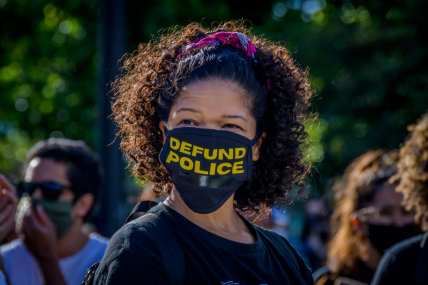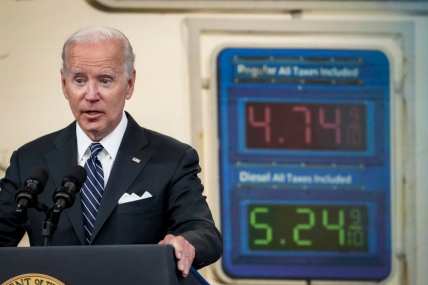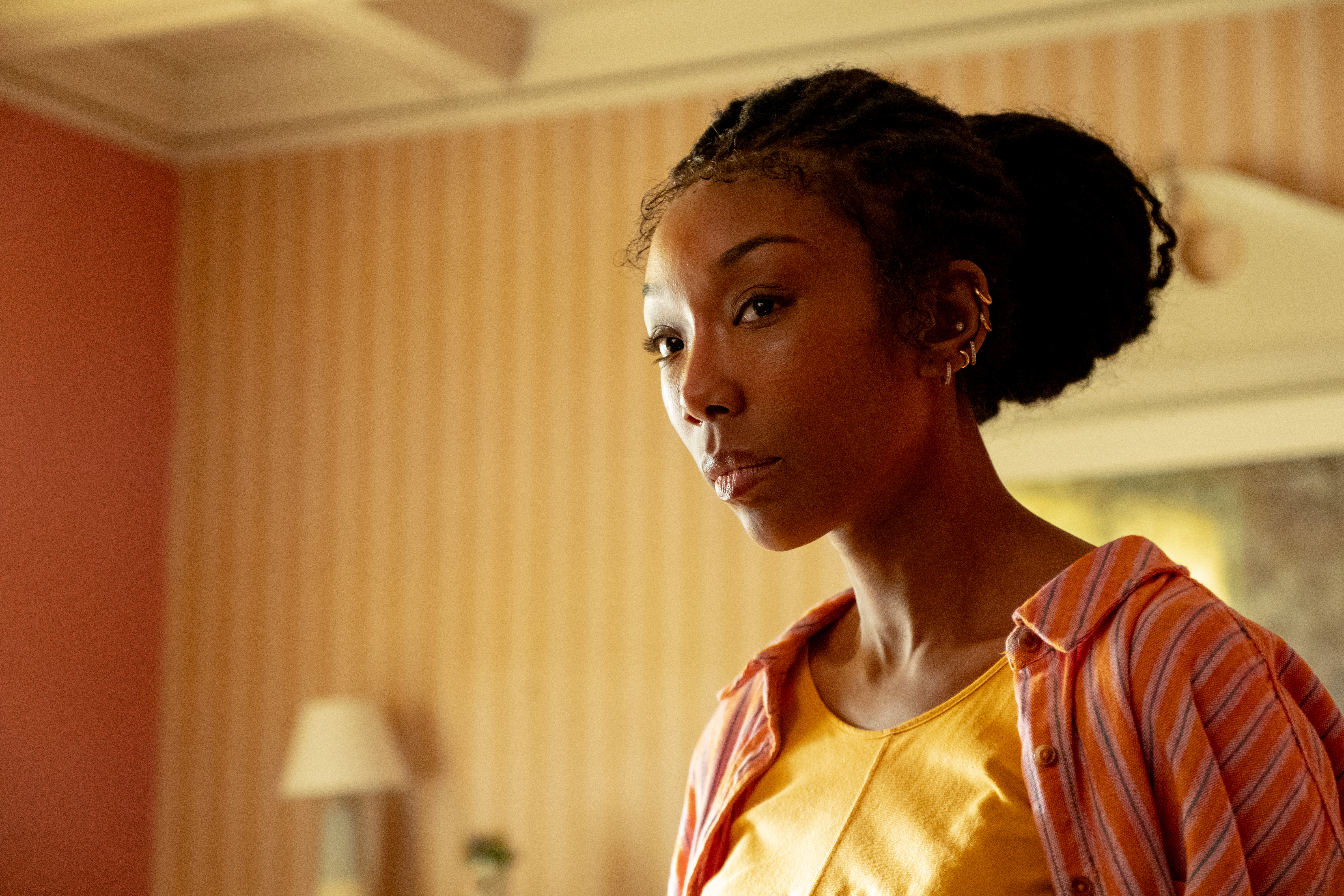Why Black voters don’t want to defund the police, explained
OPINION: Data from theGrio/KFF survey shows that Black voters don’t want to defund their local police departments...kinda.

Editor’s note: The following article is an op-ed, and the views expressed are the author’s own. Read more opinions on theGrio
Black people are not a monolith.
When theGrio and KFF surveyed Black voters about the upcoming midterm election, we found a variety of concerns among our respondents. Younger voters are twice as likely as voters over 50 to disapprove of the way President Biden is handling the job of president (40% vs. 16%). A majority of Black Republicans and Republican-leaning independents said immigration was an important factor in their political decisions, compared to 36% of Democrats. But when it comes to the importance of criminal justice and policing to their vote, there was little variation in the opinion of Black America regardless of sex, income or party affiliation.
Three out of four Black voters said criminal justice and policing is a “very important factor in making their decision about who to vote for,” including 77% of Democrats and Democratic-leaners and 68% of Republicans and those who lean that way. Roughly equal shares of men and women felt the same way. The issue was as important for Black voters who make less than $40,000 annually as it was for people who earn more than $90,000 per year.
Curiously, when asked their opinion on policing, about half of Black voters say spending on policing in their local area should be kept the same, while 34% say it should be increased and 17% say it should be decreased.
Those survey results might seem to contradict a Gallup Center on Black Voices poll that found that 72% of Black adults believe “major changes are needed to make policing better.” However, a closer look might reveal how Black voters feel about these issues and, more importantly, why polling is important.
Thinking about police departments in your area, do you think spending on policing should be increased, kept about the same or decreased?
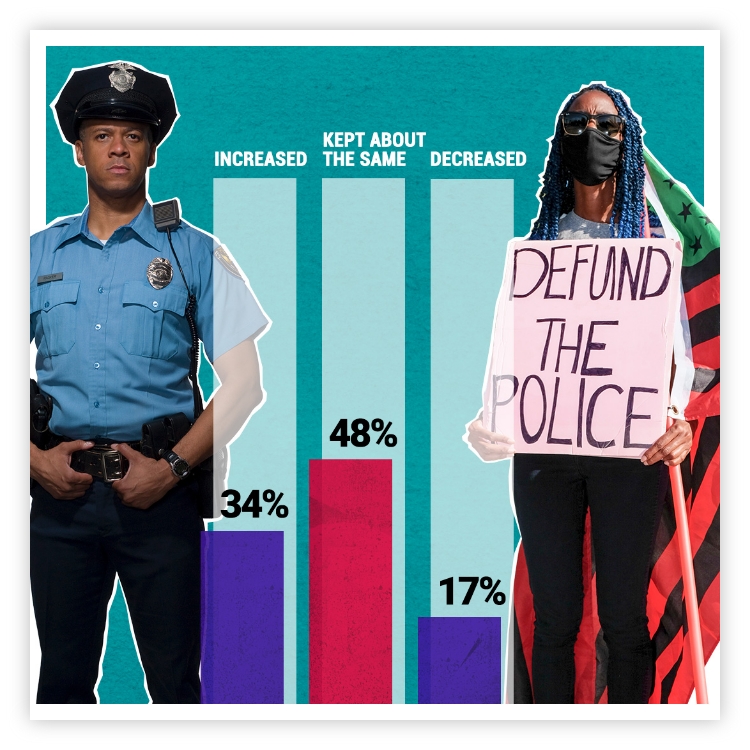
Even though there are documented racial disparities in the criminal justice system, the way this country polices Black people does not affect the everyday lives of most African Americans. Like most Americans, economic issues topped the list of Black voters’ biggest concerns facing their families. This is probably why only 3% of voters we surveyed named crime, gun violence and safety as the biggest issue facing their family when asked to state this in their own words, while 1% said criminal justice and policing was their top concern. However, 95% of Black voters said criminal justice and policing was either “very important” or “somewhat important” to their decision at the ballot box.
Think of it this way: If you polled most people, a majority might say that happiness is the most important factor in their lives. But nearly everyone would say that money affects their life decisions. Happiness is more important than money, but money is still important. Similarly, financial concerns may outweigh policing concerns, but criminal justice is still an important issue for African Americans.
The reluctance to defund the police also has a lot to do with Black voters’ pragmatism. The false notion that Black people are in love with the Democratic Party is undercut by the reality that there are only three realistic choices—voting for Democrats, voting for Republicans or allowing white people to make our political choices for us. We know we can’t always get what we want, so we make the best with what we have. For instance, seven in 10 Black voters approve of Joe Biden’s presidency, and almost six in 10 Black voters think the Democratic Party should nominate someone other than Biden for president in 2024.
The same holds true with policing.
The results must be contextualized with the fact that many Americans have been convinced that police solve crimes and keep them safe. Without alternatives to the policing problem, a pragmatic Black voter might naturally equate a decrease in police funding with reduced attention to addressing the problems that police are supposed to address. It’s not that we love the police; we just know that we live in a country that offers us three choices — no cops, more cops or waiting for white people to come up with a different way of policing Black communities.
No thank you.
Because of this country’s lack of imagination and adherence to the status quo, when a pollster asks about defunding the police, it’s natural to assume that defunding the police means defunding the protection and safety of everyday citizens. Most Black people want to change the way we address crime, safety and justice but in America, “violence intervention” is a synonym for “police.” Increased funding in “poor neighborhoods with higher crime” means funding the police — especially for someone who has only seen crime addressed with one tool — the police.
For instance, while only a third of Black voters we polled want to see an increase in police funding, that previously mentioned Gallup poll found that 88 percent of Black adults support community-based alternatives to policing such as violence intervention. The same poll shows that half of Black adults support reducing the budget of police programs and shifting the money to social programs. A separate Washington Post/Ipsos survey found that when asked to pick from several options which would do the most to reduce crime, 55 percent of Black Americans chose increasing funding to build economic opportunities in poor neighborhoods with higher crime, while a much smaller 24 percent chose to increase the number of police officers patrolling communities. Where would this money for social programs, economic opportunities and enforcing new rules come from?
How about those big ol’ police budgets?
The gap between the opinions of Black voters and how white people feel about policing isn’t a mystery. Black voters see these criminal justice issues as more important because they are likely to be affected by them. In a recent Harvard poll, 15 percent of Black adults said they had been “unfairly stopped or treated by the police” in the past year. More than a third said they were not confident that they would be treated fairly in an interaction with police in their neighborhood.
Ultimately, this is why this poll is important. Like most political issues, our views on policing are too complex to be captured by a cursory look at one question or as an afterthought that can be dismissed as a margin of error. A poll is just one of the tools we should use to address the problems that need fixing. It is important, however, to understand that tools don’t provide the answers. But, when used correctly, they can guide us in the direction of the problem.
Black voters aren’t against the idea of cops; they are against police brutality. They don’t hate badges; they hate being shot in the face. They don’t like criminals; they want police to actually arrest people while also treating everyone with an equal amount of dignity and respect. The entire idea of defunding police comes from a desire to pay for something that works. We want the police to do their jobs.
And if they can’t, maybe we should stop paying cops to disproportionately kill us.
Wait, I think I found a better slogan!
Defund racism.
About the survey
The Survey of Black Voters is the first partnership survey between theGrio and KFF, a nonprofit organization focused on research and analysis of health and other national issues. Teams from KFF and theGrio worked together to develop the questionnaire and analyze the data, and both organizations contributed financing for the survey. Each organization is solely responsible for its content.
The survey was conducted Aug. 24–Sept. 5 with a nationally representative, probability-based sample of 1,000 adults who identify as Black or African American and are registered to vote. The sample includes all voters who identify as Black or African American, including those who also identify as Hispanic or multiracial. The sampling design includes Black registered voters reached online through the SSRS Opinion Panel and the Ipsos KnowledgePanel; to reach Black voters who do not use the internet, additional interviews were conducted by calling back respondents who previously participated in an SSRS Omnibus poll and identified as Black and said they did not use the internet. The combined telephone and panel samples were weighted to match the sample’s demographics to the national U.S. population of Black voters using data from the Census Bureau’s 2020 Current Population Survey (CPS) Voting and Registration supplement. Sampling, data collection, weighting and tabulation were managed by SSRS of Glen Mills, Pennsylvania, in close collaboration with KFF researchers.
The results have a margin of sampling error of plus or minus 4 percentage points for results based on the full sample of Black voters. Full methodology and question-wording available here.
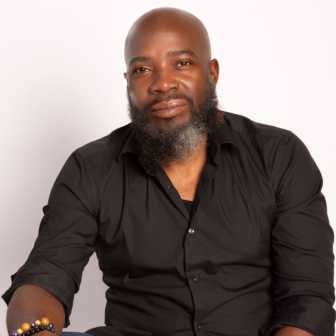
Michael Harriot is a writer, cultural critic and championship-level Spades player. His book, Black AF History: The Unwhitewashed Story of America, will be released in 2022.
TheGrio is FREE on your TV via Apple TV, Amazon Fire, Roku, and Android TV. Please download theGrio mobile apps| today!
More About:Opinion
